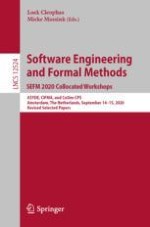2021 | OriginalPaper | Buchkapitel
Against the Illusory Will Hypothesis
A Reinterpretation of the Test Results from Daniel Wegner and Thalia Wheatley’s I Spy Experiment
verfasst von : Robert Reimer
Erschienen in: Software Engineering and Formal Methods. SEFM 2020 Collocated Workshops
Aktivieren Sie unsere intelligente Suche, um passende Fachinhalte oder Patente zu finden.
Wählen Sie Textabschnitte aus um mit Künstlicher Intelligenz passenden Patente zu finden. powered by
Markieren Sie Textabschnitte, um KI-gestützt weitere passende Inhalte zu finden. powered by
